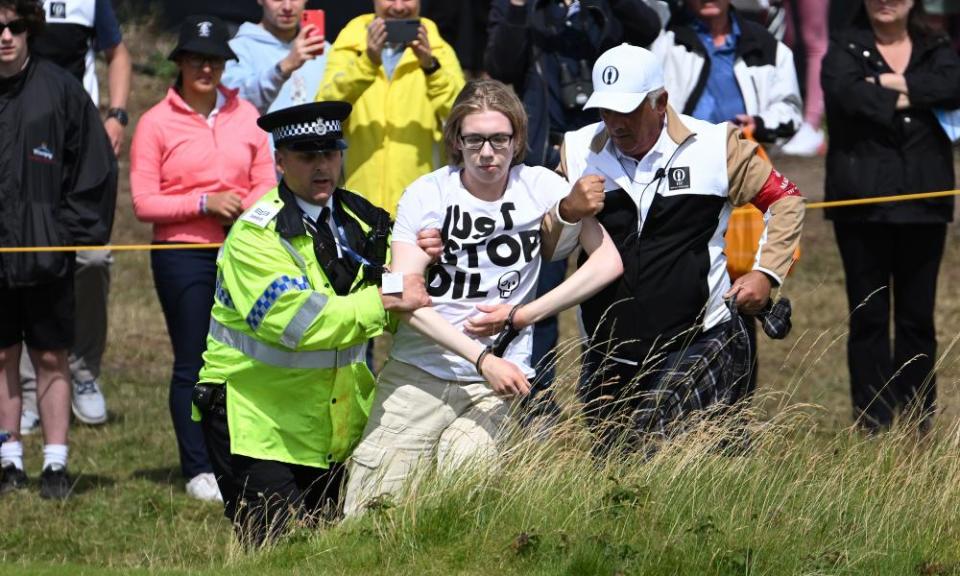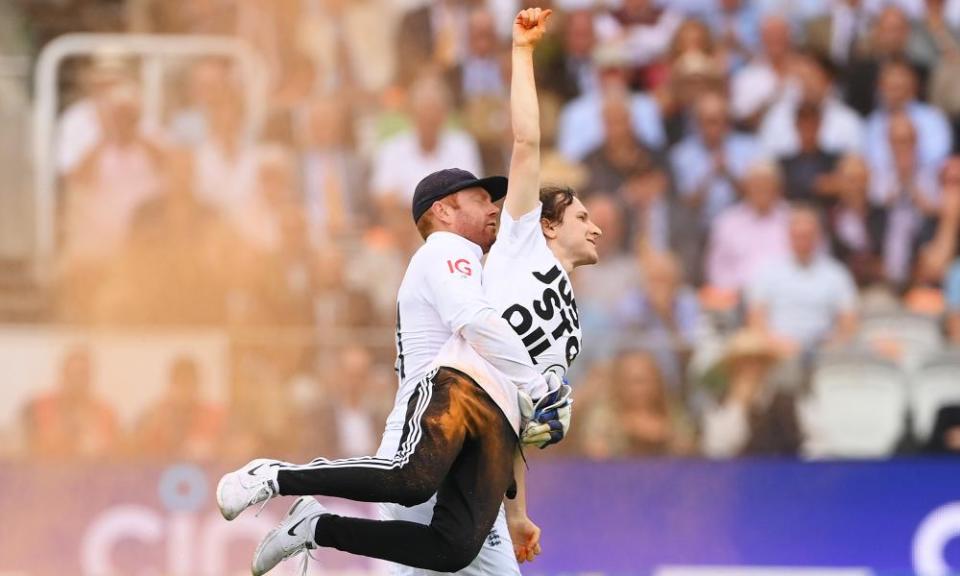
“Play was not disrupted.” With those four words the R&A summed up its message after Just Stop Oil made their latest protest on the 17th green at the Open on Friday.
A police statement had already done the heavy lifting, with its charges of conspiracy to commit criminal damage and its stern disapproval of public disorder. That left the golfing establishment to sound cool, calm and – unusually for them – like the good guys. They had, after all, triumphed. No one had been inconvenienced in the course of watching their sporting entertainment and that, by and large, has been the focus of anger at Just Stop Oil’s activity this summer. Critics find it frustratingly hard to accuse them of anything else. The protesters haven’t endangered players, or broken equipment; they haven’t altered the course of the sporting action or brought it to an unwanted conclusion. They’ve shown up, made something temporarily orange, then disappeared peacefully in a police van.
Related: Just Stop Oil protest disrupts play on day two of Open Championship
Take the pitch invasion during the Lord’s Ashes Test, which couldn’t have been more considerate. The protesters timed their incursion for the second over of the match, when it could have no effect on the cricketing narrative at all. The innocuous cornflour in their possession was never going to damage the wicket and was easily dispersed by the ground staff’s leaf-blowers. What a strange, dissociated world we currently inhabit where Europe is literally on fire, fish are suffocating in our oceans, climate change is, in the words of the UN secretary general, “out of control”, yet it’s Jonny Bairstow who is our saviour-hero, for carrying a protester to the boundary rope.
The brief interruptions in our scheduled viewing have been too much for the sporting establishment and the politicians to bear, which is why a special meeting was convened at Downing Street this month to discuss jail sentences for those involved. The home secretary, Suella Braverman, promised to be “uncompromisingly tough on the selfish protesters intent on spoiling our world-class sporting occasions”, after spectators on Wimbledon’s court 18 were forced to wait a marathon 10 minutes for the groundsmen to clear up biodegradable confetti, and British hopeful Katie Boulter was shamefully taunted by the sight of a scattered jigsaw puzzle she had no time to complete.
It was “very disappointing,” announced Sally Bolton, chief executive of the All England Lawn Tennis Club in a headmistress tone, “that people came to disrupt the enjoyment of others”. And yet the majority of spectators were far less bothered by a brief, colourful interruption of play on the outer courts than the extended security searches that benighted the queue. It’s good to know that Wimbledon officials are conscientious and detail-oriented, but you do wonder whether they spent half as much time investigating their new headline sponsor’s record on fossil fuel investment as they did searching people’s bags for chalk dust.
The outraged reaction to Just Stop Oil’s mild behaviour – and entirely appropriate sense of panic about the planetary catastrophe we are already experiencing – says far more about us than it does about the activists themselves. We’re happy to champion the idea of free speech, and we all agree that Something Must Be Done about humanity’s impending collapse. But we’d really like people to do it somewhere else, some other time, somewhere it doesn’t interfere with our chosen escapism. In that respect, the protesters’ messages are the perfect way of calling us all out.
Sport vastly inflates its own importance right now. As cover for its commercially driven growth it bangs on about the great global good it provides, and that includes laying claim to a narrative of empowering social change. From suffragettes on race courses to Williams sisters demanding equal pay, from Muhammad Ali’s draft defiance to Colin Kaepernick taking the knee, the industry stitches its history of radicalism into an inspirational montage with a soundtrack of soaring strings. It conveniently forgets that in almost every case, the reaction of the sporting authorities was to disavow, disapprove and decry.

Four years ago, a slew of books marked the anniversary of the UK’s 1969-70 sporting protests against apartheid. A 19-year-old Peter Hain was almost universally vilified for his Stop The Seventy Tour campaign, which included mass pitch invasions at rugby matches against South African teams, and vandalising grounds at which their cricketers were due to play. Fifty years on, it’s impossible not to cringe at the morally vacant position taken by the cricket authorities and the inflammatory rhetoric of the written press. Hain was called a communist, an anarchist and a terrorist; he was told that sport and politics don’t mix, that his was the “wrong way” to protest, that his tactics would turn every sports lover in Britain against his cause. In the end, Hain’s interventions triggered political change and turned the tide of public opinion. He has been a respected Parliamentarian for three decades. In half a century’s time, when we look back on a generation tap-dancing at the brink of cataclysm, we’ll no doubt fete the people who put their bodies, theirreputations and their freedom on the line to urge the vital measures their leaders refused to take. Right now, those running sport prefer to condemn them “in the strongest possible terms”.
The very organisations that fill their social-media feeds with sustainability goals and rainbow-coloured icons retreat behind “commercial reality” when called out on the big stuff, like handing over their biggest properties to oil billionaires who abuse human rights, or basing vast portions of their sponsorship income on deals with the world’s biggest investors in fossil fuels. And yet, many sports administrators have demonstrated just how flexibly minded they can be. Take the R&A’s chief executive, Martin Slumbers, who argued last year that LIV Golf, with its oil fortune backing, was “entirely driven by money” and not in the sport’s best interests. At this year’s tournament he admitted they could be a future sponsor of the Open. “The world of sport has changed dramatically in the past 12 months and it is not feasible for the R&A or golf to just ignore what is a societal change on a global basis.”
Hopefully he and his sport can be just as quick adapt to the global, societal change of increasing heat deaths and rising sea levels. Otherwise just think how inconvenient those stoppages in play are going to be.
Article courtesy of
Source link